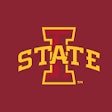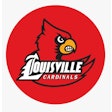With budgets continuing to tighten, public schools and communities fight to keep sports affordable - if they can keep them at all.
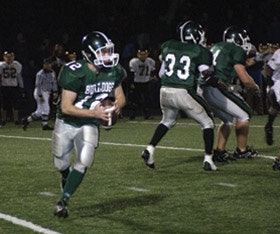
When Danny Erickson was named athletic director of Canton (Mass.) High School in 2003, he proclaimed his number-one goal to the district's superintendent of schools: eliminate the $150 pay-to-play fee for all sports. Four years later, Canton's 500 or so student-athletes faced fees of $495 per sport, with a per-family cap of $1,980 per year. "Obviously, I'm not doing too well," Erickson says. "But I'm not going to take the blame."
Blame, instead, Massachusetts' Proposition 2 1/2, a longstanding state law that prohibits annual property tax increases of more than 2.5 percent. Or better yet, blame the Canton residents who earlier this year voted to reject a $3.95 million override of Proposition 2 1/2, thereby decimating the high school's $500,000 athletic department budget. With only a $100,000 allocation from the school district, Erickson and his staff were left with little choice but to charge every student-athlete almost $500 per sport during the 2007-08 school year - or not offer sports at all.
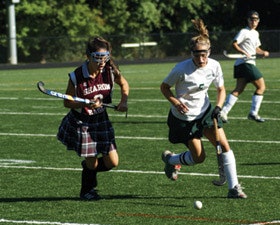
Fortunately, they didn't have to do either. The formation in May of the Canton High School Athletic Booster Club - a merger, really, of a dozen or so of the school's booster clubs that often vied for dollars from the same sources - led to the creation of the Save Our Sports (SOS) campaign. The fundraising effort collected $128,000 between May and August from corporate and individual donors, helping reduce the per-sport fee this school year to $255. "That is still an extremely insane amount of money," Erickson says. "We got used to the figure of $495 and were happy to get it to $255. But in reality, $255 is a lot of money for people to pay for something that should be free."

250+ Exhibitors & 190 Educational Sessions | abshow.com.
Compared to nearby Stoneham (Mass.) High School - which last summer eliminated all sports after a proposed $3 million property tax override failed by 237 votes - Canton's sports-financing woes seem minor. But Erickson says his school's funding ills are far from cured. "This is a last resort," he says. "This is not something that I suggest should be part of a public high school's role. We're very proud of raising this money to save sports for our kids, but we also are very aware of the dangers associated with raising this money. Our biggest fear is that we've given the community an out by proving we can run sports programs without tax dollars. We don't want people to believe that this is how athletics can and should be funded in the future."
Increasingly, pay-to-play fees are becoming a reality of high school athletics. Time was when a moderate fee - $30 to $50 per sport, say - was deemed highway robbery. But a recent study by the Detroit News determined that more than 88,000 high school student-athletes in southeastern Michigan will collectively fork over $10 million in fees to play sports this academic year. Royal Oak High in suburban Detroit, for example, charges hockey players $750 per season.
On the other hand, Oxford Area Community Schools in the Detroit area actually decided in September to drop its $150-per-sport fee, refunding $58,000 and opting to find other funding sources in the name of developing well-rounded young people. "We would not be good stewards to hang on to this money, when we've had parents who've had to stretch themselves so their children could play athletics," Oxford superintendent and former high school principal Bill Skilling told the News. "That's morally wrong. The common wisdom in public education is when going through difficult times we contract, we reduce, we cut programs. If we're losing students, and we're losing parents because of these bad economic times, then what would cause them to want to come back? Expanding opportunity. Making education something more than what somebody else is offering."
But the situation in Oxford is the exception rather than the norm these days. Consider what happened over the summer in Portland, Maine, where school district officials vowed not to implement a $100 pay-to-play fee at its high schools, but instead signed off on $153,000 in athletic department cuts, including the elimination of 12 assistant coaching positions. In Land O' Lakes, Fla., the news was a little better, but still not great, as the Pasco County School Board dropped a $25 tryout fee, reduced by $10 the fee to play a second sport and capped individual and family fees at $100 and $160, respectively. It also, however, raised first-sport fees from $35 to $60.
"We're at a crossroads in interscholastic sports," says Tim Flannery, an assistant director of the National Federation of State High School Associations, who calls the failure to pass property tax limit overrides and school levies a "death sentence" for prep athletics. "Taxpayers are saying, 'Let's get rid of sports. We don't have to pay for them.' School boards are saying, 'Hey, it's not mandatory to offer these programs.' What we're saying is, 'Well, we still have something to offer that is very important in this country.' "
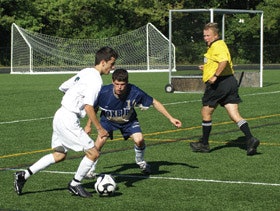
Mike Lahiff, Stoneham's athletic director when voters narrowly overruled the property tax override and eliminated his job and those of 54 coaches, was collecting about half of his department's $500,000 budget in $250-per-sport pay-to-play fees. Most of the balance of Stoneham's athletic budget was rounded out with the school district's allocation and gate receipts. "If you ask athletic directors, they would say that they never expected to be collecting fees," Lahiff says. "Ideally, every AD wants to be out improving programs, watching teams play and hopefully having success. When you start getting caught up in things like collecting money, you're taking away from what you'd really like to be doing, and should be doing."
Stoneham previously tried eliminating freshman sports, but reinstated them after incoming students started enrolling at private schools or attending classes in other districts. Some of those student-athletes who stayed could not afford to pay the fees, resulting in Stoneham losing about $30,000 in potential revenue every year to waiver programs. "Morale was really starting to drop," Lahiff recalls. "Kids were nervous, not knowing whether they would be able to play sports at Stoneham. We were trying to tell people that you can't have a high school without athletics, as we were seeing from the number of kids the school lost when we dropped the freshman program."
"Quite honestly, if we want to make kids the best they can be athletically, the club system is the best system, because that's focused solely on performance," Flannery says, fearing that some school districts and their communities have forgotten the original intent of high school athletics - to provide a positive experience that serves as an extension of the classroom and breeds healthier, more responsible individuals, not to mention school spirit and community pride. "You certainly want to make kids be the best they can be, but it's not just making the top five starters on a basketball team better; it's making all 12 of those kids better - athletically and, more important, as people."
Erickson countless times has repeated that tired but necessary argument in favor of high school athletics. "It is so cliché, but it is so true," he says. "I go to school committee meetings and have to say words like 'part of the academic experience.' I know there are people rolling their eyes, but the reality is that without sports and other similar opportunities, we're not going to lose 5 percent of our kids - we're going to lose 50 percent of them. Kids who play high school sports identify themselves as such, and it's a very healthy thing. If you ask a 15-year-old kid what they do at Canton High, they'll tell you, 'Oh, I'm a tennis player.' Identity to teenagers is so important, and it gives them the self-esteem they need. Whenever we look at cutting sports, we're taking away kids' identities - and with that, our math, science and English programs are going to suffer. We don't want that, either."
When on the stump, Lahiff often drew comparisons between Stoneham's academic and athletic achievements (including recent state titles in baseball, soccer and track). He worked with district officials to take advantage of state Department of Education grants to replace unsafe bleachers - a gesture he hoped would prove that the athletic department wasn't relying solely on tax dollars. He encouraged teams to raise funds on their own for the purchase of an ice machine for the trainer's room and welcomed a $200,000 donation from an alum's widow to renovate a pair of softball fields that were in "deplorable condition." He even appeared on a local cable-access channel with Stoneham coaches in a last-ditch appeal to residents.
The tax override still failed. Lahiff soon found another job, as athletic director at Stoneham's Middlesex League rival Watertown High School, where all sports programs are secure for the time being and there are no athletic fees. And Lahiff hopes to keep it that way. "I've learned a lot of lessons from this," he says. "But the main one is to do everything I can to fight user fees at the onset, because once they come on board, it becomes too easy to just increase them and put the burden on parents."
Back in Stoneham, the reinstatement of an annual $160-per-household trash-collection fee (a charge town officials had pledged to eliminate had the tax override passed) led to the return of sports for at least the 2007-08 academic year. The new athletic director is a Stoneham graduate who took physical education classes under Lahiff's watchful eye, and the Spartans even knocked off Watertown, 42-22, in a late-season football game. Says Lahiff, who harbors no ill will toward his old school, "This whole thing has made me a little more resilient."
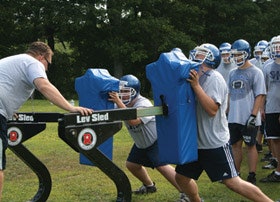
Canton's booster club has made typical booster organizations' efforts such as sponsoring banquets, for example, or purchasing senior blankets seem almost quaint. Yet Erickson believes in the power of sports in his community. After all, seven of the academic top 10 members of Canton's Class of 2007 were student-athletes (including the valedictorian and salutatorian), and the school received the coveted Hockomock League's Sportsmanship Award honoring student-athletes, coaches, parents and fans for best reflecting the values of class and sportsmanship on and off the field.
With that kind of momentum, SOS officials hope to raise another $50,000 during the school year to fully match the $178,000 slashed from the athletic budget for 2007-08. Then they would like to transition their title and mission from Save Our Sports to Support Our Sports, "which is really what a booster club should be doing," Erickson says, adding that a vote on another property tax override is likely in early 2008 - the result of which will likely determine once and for all the fate of sports at Canton High. "My personal belief is that every aspect of public schools should be free," Erickson says. "Whether or not that's reasonable is another question. But I would hope that our fees would, if not disappear, at least go down drastically if an override were to pass. On the other hand, we may be in a situation where those questions about cutting sports will become very real again if we don't fix the way we are funded. The booster club will not be coming through with $178,000 next year. There's no way."
























